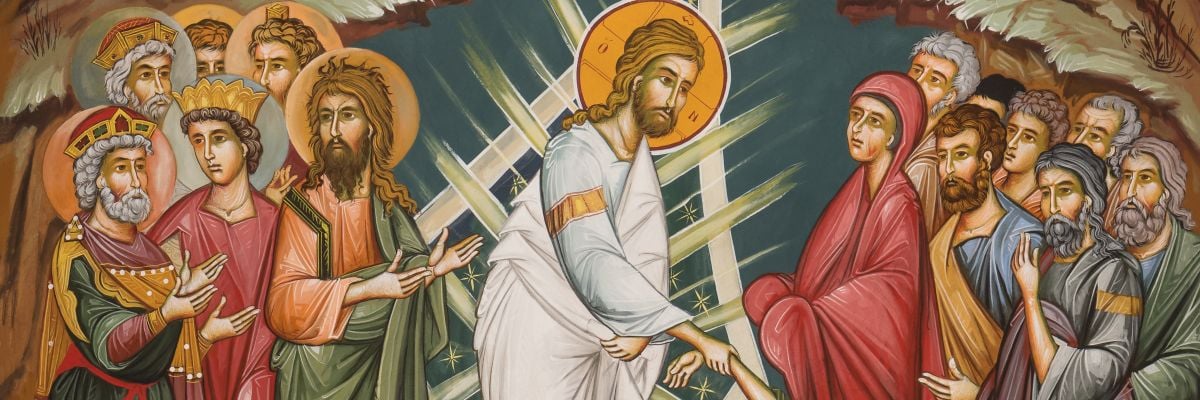The following quotations show that the first Christians understood this principle and gathered for worship on Sunday.
The Didache
“But every Lord’s day . . . gather yourselves together and break bread, and give thanksgiving after having confessed your transgressions, that your sacrifice may be pure. But let no one that is at variance with his fellow come together with you, until they be reconciled, that your sacrifice may not be profaned” (
Didache 14 [A.D. 70]).
The Letter of Barnabas
“We keep the eighth day [Sunday] with joyfulness, the day also on which Jesus rose again from the dead” (
Letter of Barnabas 15:6–8 [A.D. 74]).
Ignatius of Antioch
“[T]hose who were brought up in the ancient order of things [i.e. Jews] have come to the possession of a new hope, no longer observing the Sabbath, but living in the observance of the Lord’s day, on which also our life has sprung up again by him and by his death” (
Letter to the Magnesians 8 [A.D. 110]).
Justin Martyr
“But Sunday is the day on which we all hold our common assembly, because it is the first day on which God, having wrought a change in the darkness and matter, made the world; and Jesus Christ our Savior on the same day rose from the dead” (
First Apology 67 [A.D. 155]).
The Didascalia
“The apostles further appointed: On the first day of the week let there be service, and the reading of the holy scriptures, and the oblation [sacrifice of the Mass], because on the first day of the week [i.e., Sunday] our Lord rose from the place of the dead, and on the first day of the week he arose upon the world, and on the first day of the week he ascended up to heaven, and on the first day of the week he will appear at last with the angels of heaven” (
Didascalia 2 [A.D. 225]).
Origen
“Hence it is not possible that the [day of] rest after the Sabbath should have come into existence from the seventh [day] of our God. On the contrary, it is our Savior who, after the pattern of his own rest, caused us to be made in the likeness of his death, and hence also of his resurrection” (
Commentary on John 2:28 [A.D. 229]).
Victorinus
“The sixth day [Friday] is called
parasceve, that is to say, the preparation of the kingdom. . . . On this day also, on account of the passion of the Lord Jesus Christ, we make either a station to God or a fast. On the seventh day he rested from all his works, and blessed it, and sanctified it. On the former day we are accustomed to fast rigorously, that on the Lord’s day we may go forth to our bread with giving of thanks. And let the
parasceve become a rigorous fast, lest we should appear to observe any Sabbath with the Jews . . . which Sabbath he [Christ] in his body abolished” (
The Creation of the World [A.D. 300]).
Eusebius of Caesarea
“They [the early saints of the Old Testament] did not care about circumcision of the body, neither do we [Christians]. They did not care about observing Sabbaths, nor do we. They did not avoid certain kinds of food, neither did they regard the other distinctions which Moses first delivered to their posterity to be observed as symbols; nor do Christians of the present day do such things” (
Church History 1:4:8 [A.D. 312]).
“[T]he day of his [Christ’s] light . . . was the day of his resurrection from the dead, which they say, as being the one and only truly holy day and the Lord’s day, is better than any number of days as we ordinarily understand them, and better than the days set apart by the Mosaic law for feasts, new moons, and Sabbaths, which the apostle [Paul] teaches are the shadow of days and not days in reality” (
Proof of the Gospel 4:16:186 [A.D. 319]).
Athanasius
“The Sabbath was the end of the first creation, the Lord’s day was the beginning of the second, in which he renewed and restored the old in the same way as he prescribed that they should formerly observe the Sabbath as a memorial of the end of the first things, so we honor the Lord’s day as being the memorial of the new creation” (
On Sabbath and Circumcision 3 [A.D. 345]).
Cyril of Jerusalem
“Fall not away either into the sect of the Samaritans or into Judaism, for Jesus Christ has henceforth ransomed you. Stand aloof from all observance of Sabbaths and from calling any indifferent meats common or unclean” (
Catechetical Lectures 4:37 [A.D. 350]).
Council of Laodicea
“Christians should not Judaize and should not be idle on the Sabbath, but should work on that day; they should, however, particularly reverence the Lord’s day and, if possible, not work on it, because they were Christians” (Canon 29 [A.D. 360]).
John Chrysostom
“[W]hen he [God] said, ‘You shall not kill’ . . . he did not add, ‘because murder is a wicked thing.’ The reason was that conscience had taught this beforehand, and he speaks thus, as to those who know and understand the point. Wherefore when he speaks to us of another commandment, not known to us by the dictate of conscience, he not only prohibits, but adds the reason. When, for instance, he gave commandment concerning the Sabbath— ‘On the seventh day you shall do no work’—he subjoined also the reason for this cessation. What was this? ‘Because on the seventh day God rested from all his works which he had begun to make’ [Ex. 20:10-11]. . . . For what purpose then, I ask, did he add a reason respecting the Sabbath, but did no such thing in regard to murder? Because this commandment was not one of the leading ones. It was not one of those which were accurately defined of our conscience, but a kind of partial and temporary one, and for this reason it was abolished afterward. But those which are necessary and uphold our life are the following: ‘You shall not kill. . . . You shall not commit adultery. . . . You shall not steal.’ On this account he adds no reason in this case, nor enters into any instruction on the matter, but is content with the bare prohibition” (
Homilies on the Statutes 12:9 [A.D. 387]).
“You have put on Christ, you have become a member of the Lord and been enrolled in the heavenly city, and you still grovel in the law [of Moses]? How is it possible for you to obtain the kingdom? Listen to Paul’s words, that the observance of the law overthrows the gospel, and learn, if you will, how this comes to pass, and tremble, and shun this pitfall. Why do you keep the Sabbath and fast with the Jews?” (
Homilies on Galatians 2:17 [A.D. 395]).
“The rite of circumcision was venerable in the Jews’ account, forasmuch as the law itself gave way thereto, and the Sabbath was less esteemed than circumcision. For that circumcision might be performed, the Sabbath was broken; but that the Sabbath might be kept, circumcision was never broken; and mark, I pray, the dispensation of God. This is found to be even more solemn than the Sabbath, as not being omitted at certain times. When then it is done away, much more is the Sabbath” (
Homilies on Philippians 10 [A.D. 402]).
The Apostolic Constitutions
“And on the day of our Lord’s resurrection, which is the Lord’s day, meet more diligently, sending praise to God that made the universe by Jesus, and sent him to us, and condescended to let him suffer, and raised him from the dead. Otherwise what apology will he make to God who does not assemble on that day . . . in which is performed the reading of the prophets, the preaching of the gospel, the oblation of the sacrifice, the gift of the holy food” (
Apostolic Constitutions 2:7:60 [A.D. 400]).
Augustine
“Well, now, I should like to be told what there is in these ten commandments, except the observance of the Sabbath, which ought not to be kept by a Christian” (
The Spirit and the Letter 24 [A.D. 412]).
Pope Gregory I
“It has come to my ears that certain men of perverse spirit have sown among you some things that are wrong and opposed to the holy faith, so as to forbid any work being done on the Sabbath day. What else can I call these [men] but preachers of Antichrist, who when he comes will cause the Sabbath day as well as the Lord’s day to be kept free from all work. For because he [the Antichrist] pretends to die and rise again, he wishes the Lord’s day to be held in reverence; and because he compels the people to Judaize that he may bring back the outward rite of the law, and
subject the perfidy of the Jews to himself, he wishes the Sabbath to be observed. For this which is said by the prophet, ‘You shall bring in no burden through your gates on the Sabbath day’ [Jer. 17:24] could be held to as long as it was lawful for the law to be observed according to the letter. But after that the grace of almighty God, our Lord Jesus Christ, has appeared, the commandments of the law which were spoken figuratively cannot be kept according to the letter. For if anyone says that this about the Sabbath is to be kept, he must needs say that carnal sacrifices are to be offered. He must say too that the commandment about the circumcision of the body is still to be retained. But let him hear the apostle Paul saying in opposition to him: ‘If you be circumcised, Christ will profit you nothing’ [Gal. 5:2]” (
Letters 13:1 [A.D. 597]).
Some religious organizations claim the Church "changed" the day of worship from Saturday to Sunday, but Scripture and Tradition reveal something else.

www.catholic.com
This article is an extremely detailed look at Sunday worship before Constantine
Visit gci.org and browse Grace Communion International's extensive library of articles on God, the Bible, faith, and the Christian Life.
archive.gci.org

www.biblegateway.com






